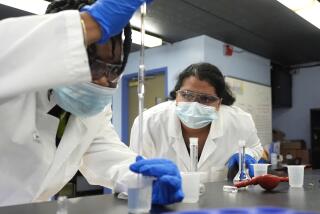A glass that’s half-empty
As if we didn’t have enough to worry about, the quietly apocalyptic “Flow” makes a good case that what’s going on with our planet’s water supply should make you very, very afraid. Any film that begins with a bleak W.H. Auden quote (“Thousands have lived without love, not one without water”) is not going to be a ray of sunshine in anyone’s life.
Made over a five-year period by director Irena Salina, who went all over the world and talked to an impressive list of experts, “Flow” (which also stands for “For Love of Water”) is a smartly done, involving look at a number of interrelated water issues.
For one thing, it seems that the planet is simply running out of water, which, given our dependence on it, is not a good thing. “We have wars going on over oil,” one of the film’s authorities says. “Water can be oil all over again.”
Also a problem is that as a society we are terminally polluting what water we have. “Flow” opens with a shot of India’s Ganges, kind of the poster image for polluted water, and it tells us that water-borne diseases kill more people annually than either AIDS or wars.
It turns out, however, that these kinds of problems are not limited to the developing world. Rocket fuel seems to have made its way into some American water systems, and herbicides such as Atrazine, banned in the European Union, are still in wide use over here.
More unexpected is “Flow’s” examination of the bitter, at times physical, conflicts that erupt when major corporations have tried to privatize water in parts of Bolivia, South Africa and other countries.
From the companies’ point of view, they are providing a service by bringing safe water to areas that don’t have it. But if the need to make a profit means that safe water will be priced above what the poorest people can afford to pay, those folks will continue to use the unsafe but free alternative. It is a dilemma we are likely to hear more about in years to come.
One of “Flow’s” most intriguing segments concerns bottled water, the alternative of choice for society’s most prosperous elements but a liquid that turns out to be less regulated and possibly less safe than what comes through the tap. In addition, we’re told, society could provide pure water for everyone on the planet for what we pay for the bottled kind. It’s something to think about, as is this entire film.
--
--
“Flow.” MPAA rating: Unrated. Running time: 1 hour, 24 minutes. In limited release.
More to Read
Only good movies
Get the Indie Focus newsletter, Mark Olsen's weekly guide to the world of cinema.
You may occasionally receive promotional content from the Los Angeles Times.











